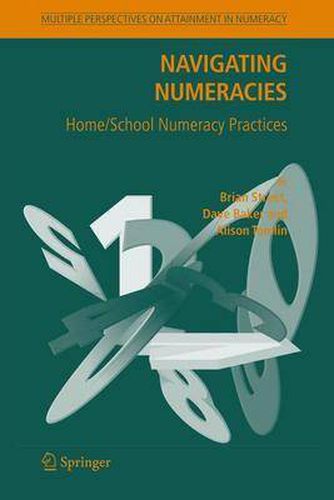Readings Newsletter
Become a Readings Member to make your shopping experience even easier.
Sign in or sign up for free!
You’re not far away from qualifying for FREE standard shipping within Australia
You’ve qualified for FREE standard shipping within Australia
The cart is loading…






This title is printed to order. This book may have been self-published. If so, we cannot guarantee the quality of the content. In the main most books will have gone through the editing process however some may not. We therefore suggest that you be aware of this before ordering this book. If in doubt check either the author or publisher’s details as we are unable to accept any returns unless they are faulty. Please contact us if you have any questions.
Abstract. This introduction sets the scene for the remainder of the book by considering first the international context of widespread concern about the improvement of numeracy skills. This is related to reform movements in the UK, the US and other countries aimed at modernising primary (elementary) school mathematics curricula. A detailed account is given of the National Numeracy Strategy in England, a systemic government-imposed response to concern about standards implemented in 1999/2000. This includes a discussion of the alternative meanings of numeracy. An earlier initiative sponsored by a UK charitable trust reacting to concern about primary numeracy was the Leverhulme Numeracy Research Programme. This large-scale longitudinal study and linked set of case-study projects, focusing on reasons for low attainment, took place during 1997-2002. This book, and each other in the same series, is based on results of that research. The timescale fortuitously enabled the research team to also report on some effects of the systemic reform in the National Numeracy Strategy. 1. THE INTERNATIONAL CONTEXT In many countries, there are recurring periods of national concern about the low standards of calculation skills shown by children in primary (elementary) schools. Recently these concerns have become more urgent and more political with the publication of international comparisons of mathematical achievement, first at secondary and more recently at primary level (e. g. Lapointe, Mead et al. 1992; Mullis et al. , 1997).
$9.00 standard shipping within Australia
FREE standard shipping within Australia for orders over $100.00
Express & International shipping calculated at checkout
This title is printed to order. This book may have been self-published. If so, we cannot guarantee the quality of the content. In the main most books will have gone through the editing process however some may not. We therefore suggest that you be aware of this before ordering this book. If in doubt check either the author or publisher’s details as we are unable to accept any returns unless they are faulty. Please contact us if you have any questions.
Abstract. This introduction sets the scene for the remainder of the book by considering first the international context of widespread concern about the improvement of numeracy skills. This is related to reform movements in the UK, the US and other countries aimed at modernising primary (elementary) school mathematics curricula. A detailed account is given of the National Numeracy Strategy in England, a systemic government-imposed response to concern about standards implemented in 1999/2000. This includes a discussion of the alternative meanings of numeracy. An earlier initiative sponsored by a UK charitable trust reacting to concern about primary numeracy was the Leverhulme Numeracy Research Programme. This large-scale longitudinal study and linked set of case-study projects, focusing on reasons for low attainment, took place during 1997-2002. This book, and each other in the same series, is based on results of that research. The timescale fortuitously enabled the research team to also report on some effects of the systemic reform in the National Numeracy Strategy. 1. THE INTERNATIONAL CONTEXT In many countries, there are recurring periods of national concern about the low standards of calculation skills shown by children in primary (elementary) schools. Recently these concerns have become more urgent and more political with the publication of international comparisons of mathematical achievement, first at secondary and more recently at primary level (e. g. Lapointe, Mead et al. 1992; Mullis et al. , 1997).